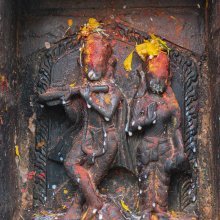Radhakrishna, Rādhākṛṣṇa: 5 definitions
Introduction:
Radhakrishna means something in Hinduism, Sanskrit. If you want to know the exact meaning, history, etymology or English translation of this term then check out the descriptions on this page. Add your comment or reference to a book if you want to contribute to this summary article.
The Sanskrit term Rādhākṛṣṇa can be transliterated into English as Radhakrsna or Radhakrishna, using the IAST transliteration scheme (?).
Images (photo gallery)
In Hinduism
Vyakarana (Sanskrit grammar)
Source: Wikisource: A dictionary of Sanskrit grammarRādhākṛṣṇa (राधाकृष्ण).—(गोस्वामी (gosvāmī)) a grammarian who wrote two elementary graumar treatises (1) अव्ययार्थे (avyayārthe) and (2) वैयाकरणसर्वस्वसूची (vaiyākaraṇasarvasvasūcī).

Vyakarana (व्याकरण, vyākaraṇa) refers to Sanskrit grammar and represents one of the six additional sciences (vedanga) to be studied along with the Vedas. Vyakarana concerns itself with the rules of Sanskrit grammar and linguistic analysis in order to establish the correct context of words and sentences.
Languages of India and abroad
Sanskrit dictionary
Source: Cologne Digital Sanskrit Dictionaries: Aufrecht Catalogus Catalogorum1) Rādhākṛṣṇa (राधाकृष्ण) as mentioned in Aufrecht’s Catalogus Catalogorum:—Adhyātmarāmāyaṇarahasya.
2) Rādhākṛṣṇa (राधाकृष्ण):—Oṣadhināmāvalī. Kośasaṃgraha. Nighaṇṭu med.
3) Rādhākṛṣṇa (राधाकृष्ण):—Caurapañcāśikāṭīkā.
4) Rādhākṛṣṇa (राधाकृष्ण):—Jagannāthanavaratna. Jagannāthastotra.
5) Rādhākṛṣṇa (राधाकृष्ण):—Pratiṣṭhāpaddhati. Śivālayapratiṣṭhā.
6) Rādhākṛṣṇa (राधाकृष्ण):—Rāmāyaṇasārasaṃgraha.
7) Rādhākṛṣṇa (राधाकृष्ण):—Varṣatantra.
8) Rādhākṛṣṇa (राधाकृष्ण):—Nighaṇṭusārasaṃgraha med.
9) Rādhākṛṣṇa (राधाकृष्ण):—son of Divānacandra: Sarvārthacintāmaṇiṭīkā.
10) Rādhākṛṣṇa (राधाकृष्ण):—Āyuḥprabodhinī jy.
11) Rādhākṛṣṇa (राधाकृष्ण):—son of Ratnagarbha, composed his peculiar interpretation of the Caurapañcāśat in 1470. Hpr. 1, 118.
Source: Cologne Digital Sanskrit Dictionaries: Monier-Williams Sanskrit-English Dictionary1) Rādhākṛṣṇa (राधाकृष्ण):—[=rādhā-kṛṣṇa] [from rādhā > rādh] m. Name of various authors and teachers (also with vedānta-vāg-īśa, gosvāmin and śarman), [Catalogue(s)]
2) [v.s. ...] [dual number] R° and Kṛṣṇa, [Religious Thought and Life in India 184]
[Sanskrit to German]
Sanskrit, also spelled संस्कृतम् (saṃskṛtam), is an ancient language of India commonly seen as the grandmother of the Indo-European language family (even English!). Closely allied with Prakrit and Pali, Sanskrit is more exhaustive in both grammar and terms and has the most extensive collection of literature in the world, greatly surpassing its sister-languages Greek and Latin.
See also (Relevant definitions)
Partial matches: Krishna, Radha.
Starts with: Radhakrishna gosvamin, Radhakrishna sharman, Radhakrishna vedantavagisha, Radhakrishnabhakticandrika, Radhakrishnacaitanyopasanarcapaddhati, Radhakrishnaganoddeshadipika, Radhakrishnakosha, Radhakrishnalila, Radhakrishnapadacihna, Radhakrishnapancanga, Radhakrishnapremasamputakavya, Radhakrishnapuja, Radhakrishnarcanadipika, Radhakrishnarupacintamani, Radhakrishnayoh premasamputakavyam.
Full-text (+29): Radhakrishnakosha, Shripaddhati, Dhaturatnavali, Radhakrishnalila, Radhakrishnapadacihna, Radhakrishnarupacintamani, Radhakrishnarcanadipika, Shraddha, Vilasa, Saprasadaradhakrishnapratishthavidhi, Siddhadeha, Radhamadhavarupacintamani, Gopalatapanishruti, Adhyatmaramayanarahasya, Nighantusarasamgraha, Jagannathanavaratna, Radhakrishna gosvamin, Shivalayapratishtha, Gitagovinda, Abdarahasya.
Relevant text
Search found 31 books and stories containing Radhakrishna, Rādhākṛṣṇa, Radhakrsna, Radha-krishna, Rādhā-kṛṣṇa, Radha-krsna; (plurals include: Radhakrishnas, Rādhākṛṣṇas, Radhakrsnas, krishnas, kṛṣṇas, krsnas). You can also click to the full overview containing English textual excerpts. Below are direct links for the most relevant articles:
Bhajana-Rahasya (by Srila Bhaktivinoda Thakura Mahasaya)
Text 23 < [Chapter 4 - Caturtha-yāma-sādhana (Madhyāhna-kālīya-bhajana–ruci-bhajana)]
Text 3 < [Chapter 8 - Aṣṭama-yāma-sādhana (Rātri-līlā–prema-bhajana sambhoga)]
Text 34 < [Chapter 1 - Prathama-yāma-sādhana (Niśānta-bhajana–śraddhā)]
Garga Samhita (English) (by Danavir Goswami)
Verse 1.15.72 < [Chapter 15 - Revelation of the Universal Form to Nanda’s Wife]
Verse 1.15.65 < [Chapter 15 - Revelation of the Universal Form to Nanda’s Wife]
Verses 2.19.11-12 < [Chapter 19 - The Rāsa-dance Pastime]
Srila Gurudeva (The Supreme Treasure) (by Swami Bhaktivedanta Madhava Maharaja)
The Mercy of a Rasika Vaiṣṇava < [Chapter 2.4 - The Uttamā Bhāgavata and Kṛpa-Pātra]
Preparation and Departure for America < [Chapter 2.7 - Śrīla Gurudeva and Śrīla Bhaktivedānta Swāmī Mahārāja]
Gratitude < [Chapter 2.19 - The Concluding Transcendental Pastimes]
Chaitanya Bhagavata (by Bhumipati Dāsa)
Verse 1.9.220 < [Chapter 9 - Nityānanda’s Childhood Pastimes and Travels to Holy Places]
Verse 2.12.26 < [Chapter 12 - The Glories of Nityānanda]
Verse 1.1.78 < [Chapter 1 - Summary of Lord Gaura’s Pastimes]
